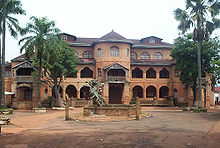| Revision as of 09:21, 31 May 2014 editPeaceworld111 (talk | contribs)Autopatrolled, Extended confirmed users, Pending changes reviewers, Rollbackers9,275 edits rv vandal← Previous edit | Revision as of 02:24, 13 June 2014 edit undoSeptate (talk | contribs)Extended confirmed users2,303 edits Corrected percentage per source+modified statement.Tags: Mobile edit Mobile web editNext edit → | ||
| Line 1: | Line 1: | ||
| ] people at ], West Province]] | ] people at ], West Province]] | ||
| {{islam by country}} | {{islam by country}} | ||
| ] comprise roughly |
] comprise roughly 21 percent of the 21 million inhabitants in the ] country of ].<ref>* "". January 2008. United States Department of State. Accessed 21 February 2008.</ref> The vast majority of the ] population is ] of ] school of ], with sizeable ] and ] minorities.<ref>{{cite web | url=http://www.pewforum.org/uploadedFiles/Topics/Religious_Affiliation/Muslim/the-worlds-muslims-full-report.pdf | title=The World's Muslims: Unity and Diversity | accessdate=August 14, 2012 | date=August 9, 2012 | publisher=Pew Forum on Religious & Public life}}</ref> The ], a pastoral nomadic group, spread Islam in early 19th century West Africa largely through commercial activity and ] brotherhoods (] and ]). In the northern provinces, the locally dominant Fulani overwhelmingly is Muslim. Other ethnic groups, known collectively as the ], generally practice some form of Islam. The ] ethnic group of the West Province is also largely Muslim. | ||
| ==Islam in German Cameroon 1884-2008== | ==Islam in German Cameroon 1884-2008== | ||
Revision as of 02:24, 13 June 2014

Muslims comprise roughly 21 percent of the 21 million inhabitants in the African country of Cameroon. The vast majority of the Muslim population is Sunni of Maliki school of jurisprudence, with sizeable Ahmadiyya and Shia minorities. The Fulani, a pastoral nomadic group, spread Islam in early 19th century West Africa largely through commercial activity and Sufi brotherhoods (Qadiri and Tijani). In the northern provinces, the locally dominant Fulani overwhelmingly is Muslim. Other ethnic groups, known collectively as the Kirdi, generally practice some form of Islam. The Bamoun ethnic group of the West Province is also largely Muslim.
Islam in German Cameroon 1884-2008
In the rush to claim African territories Germany first entered Cameroon in 1884 and established rule in northern Cameroon by 1902. Throughout the German colonial period, the Adamawa and Lake Chad regions were governed by combining heavy military presence with indirect rule. The local Muslim rulers, called Lamido in Adamawa and Sultan in the far north, remained in power, although their influence was much more limited than during the nineteenth century, owing their legitimacy to the Germans and not to the Emir in Yola, the Caliph in Sokoto or the Shehu in Kuka. Existing political and legal institutions, together with Muslim and native law and customs, were kept intact. Contrary to British rule in Northern Nigeria, German indirect rule did not involve immediate taxes or land reforms before 1913, when such reforms were proposed but, due to the war, never implemented.
References
- * "Background Note: Cameroon". January 2008. United States Department of State. Accessed 21 February 2008.
- "The World's Muslims: Unity and Diversity" (PDF). Pew Forum on Religious & Public life. August 9, 2012. Retrieved August 14, 2012.
| Islam in Africa | |
|---|---|
| Sovereign states |
|
| States with limited recognition | |
| Dependencies and other territories |
|
This Islam by country-related article is a stub. You can help Misplaced Pages by expanding it. |
This Cameroon-related article is a stub. You can help Misplaced Pages by expanding it. |
